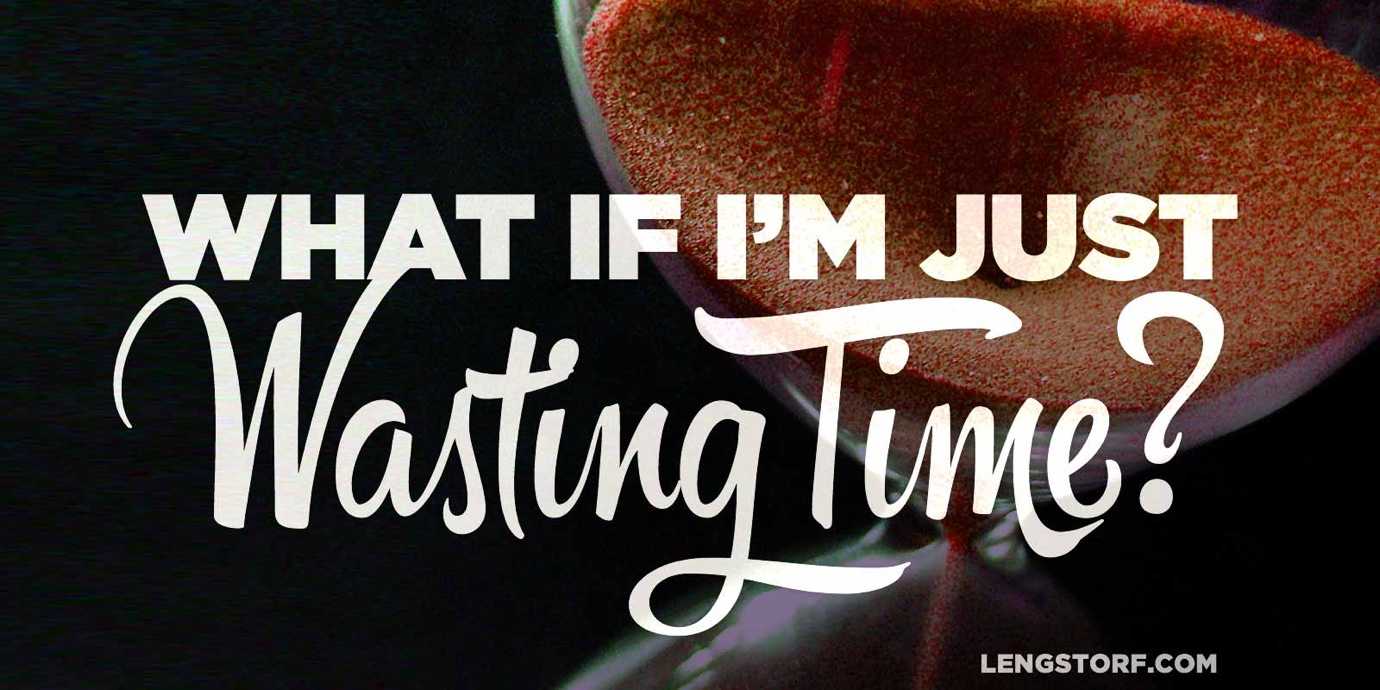Am I Wasting My Time on the Wrong Goals?
At breakfast a few days ago, Marisa and I were talking about her transition into freelance copywriting over the last year, and the twists and turns she’s dealt with along the way. There was a twinge of despair around the edges of the conversation, and when I poked at it1 she started talking about time.
That’s what you’re supposed to do when you see that something is bothering someone, right? Poke at the sore spot?

”I worry that I’ve already wasted so much time. What if I start working on one of these ideas and it doesn’t work? I’ll be even further behind,” she sighed, and gave me her best exasperated pout. “I just don’t want to waste any more time going in the wrong direction.”
For a brief, strange second I saw inside Marisa’s mind.
I’m in at the edge of a clearing ringed with orchids, a rainbow flowing through its center like a small stream. Near the edge, a unicorn drinks from the rainbow, glittering like David Bowie and humming “Once Upon a Dream”. It spots me, and pointedly looks toward the mouth of the rainbow.
I follow its gaze, and I see a teal lake at the foot of a mountain. At the mouth of the rainbow, a mermaid with an explosion of curls stands guard, and I realize that the mountain isn’t a mountain at all, but magical sand from a magical hourglass — Marisa’s time.
As I draw closer, the mermaid bristles and booms, “HEY. BACK THE FUCK UP. I’M PROTECTING THIS TIME.”
And then I had one of those realizations that seemed so obvious in retrospect: Marisa, and I, and probably everyone else ever — we were looking at time all wrong.
A Shift in the Realities of Time
Let’s get deep(ly unscientific) for a minute and talk about time, as it exists in our current realities.
Time flows through a mysterious hole in the universe, originating from a much-debated wellspring just beyond our comprehension. So time rains down upon us from the fourth dimension or whatever, and we’re all given the opportunity to use a finite amount of it — until we run out of time and die.
And that’s where the fundamental misunderstanding comes in.
We pretend time can be spent…

There’s a delusion that, with an appropriate container, we can store our time for later. We say things like, “I don’t want to spend my time that way,” and imagine ourselves catching those unused hours in a jar, to be spent when we do want to spend our time some way.
We picture time as a liquid, like water, that can be dammed, diverted, stoppered, stored, labeled, and used at a later date.
Over time, the most temporally responsible among us will boast shelves upon shelves of bottled time, waiting for the right time to spend our carefully stockpiled time. Aging it, so to speak.
…but that’s not how time works.
A more accurate analogy for time is sunlight. Or wind.
The world spins, and depending on where we stand on it, we get so much sunlight during the day. And if it’s a windy day, the wind blows.
We can’t store it. There’s no bottle-aged sunshine. You can’t crack open a can of Blustery October Morning on a stifling July afternoon.
Time — like sunlight and wind — is a linear, nontransferable resource. It happens once, and then it’s over. Time passes and is lost, whether you “spent it” on something valuable or not.
The Two Possible Outcomes of Passing Time
With time’s impermanence in mind, the idea that you can “waste time” by working on “the wrong ideas” is ridiculous.
Time will pass, whether or not you’re working on something.
The passing of time can provide two outcomes:
- You receive new information about the world and where you currently fit best in it.
- You receive no new information.
In one of these situations, we’re putting time to work for us. In the other, we’re letting time pass — often under the pretense of “focusing only on what matters” — and gaining nothing.
Outcome #1: You receive new information about the world.
If you work on any idea — even the “wrong” ones — you will receive new information:
- “Turns out I don’t really like sales. I don’t want to do that anymore.”
- “I really enjoyed working with my hands when I took that woodworking class. I should do more of that.”
- “I thought marine biologists just played with dolphins! Why am I scraping fish shit off an aquarium floor?”
This information can be used to refine how your future time is spent. By experiencing something new, you have improved your understanding of the world, and by extension, your ability to make better decisions.
Outcome #2: You receive no new information about the world.
Thanks in no small part to the “only spend time on things that make your life better” chorus all around us, there’s a pressure to wait for the right idea before putting in a solid effort.
Doing nothing because you’re waiting for the “right idea” guarantees your time is thoroughly and completely wasted.
You’re still out the same amount of time as if you’d worked on something else, except in this case you’ve learned nothing.
Use Your Time Now — You Can’t Use It Later

Our time is not like our bank balance. We can’t live frugally and accrue tons of time to spend later in life, after we’ve learned what we enjoy.
We’re born with a finite amount of time, and each day we lose 24 hours of it.
When you refuse to start on something because you’re worried you might waste your time on it, you manage to both a) irrevocably waste your time, and b) make no progress toward figuring out what the “right idea” may be.
Pull the Trigger on New Projects and Learn Something
If we choose to sit and wait for “the right ideas” to come to us, we might wait an awfully long time. However, if you’re constantly working on something — even if it ends up being the “wrong” idea — you’ll learn things that will help you find the right ideas that much more quickly.
So if you find yourself wanting to hold off on a new project because you’re worried it might be a waste of time, ask yourself two questions:
- If I do this, will it prevent me from spending time on something that I know is more important to me?
- If not, what would I do with this time instead?
If you’re not starting a new project at the expense of something valuable to you, then the initial fear of “misspent time” is irrelevant — you don’t have a better place to allocate this time.2
“Trying to come up with a better use of my time,” is not a valid excuse.
And if you don’t start this new project — and you don’t have something more valuable to spend your time on — where will your time go instead? Idle “research” on social media? Reading yet another article about finding your passion3 or being more productive?4 Some other clever disguise for completely wasting time?
“I used to be miserable, just like you, until I found my passion, which is helping other people find their passion. You should buy my ebook on finding your passion so you, too, can find your passion — which is probably selling ebooks to other people about finding their passion.”
(Snark notwithstanding, I do think you should do what you love.)
Productivity is important. I talk about productivity frequently. But there’s a point where productivity research is like turning down sex because you’re too busy masturbating.

There is no better way to spend your time than by gaining experience.
Don’t worry about wasting time. It’s spent no matter what.
Instead, worry about using time. Make sure the time that passes results in new information and new experiences.
So go start that project that might be doomed. Build that side business that you’re nervous might fail. Take that class. Take the trip. Take action.
It’s certainly more temporally responsible than letting that time pass unused.
And — hey — you might just learn something.
What to do next.
As adults, we’re supposed to build careers, build relationships, build futures, build happiness… It’s all pretty overwhelming. It’s easy to feel stuck — like we’re on autopilot, punching a clock, and buried in tasks we don’t really care about.
Wouldn’t it be nice to get some balance back? To have extra time every day to dedicate to the things that actually matter to you?
I want to help: I’ve compiled 5 Habits of the Unfuckwithably Productive, and I want to give it to you for free. These are time-tested habits that helped me break the cycle of overwork and exhaustion; this is how I spend less than 40 hours a week on the computer — while making a living and traveling the world.